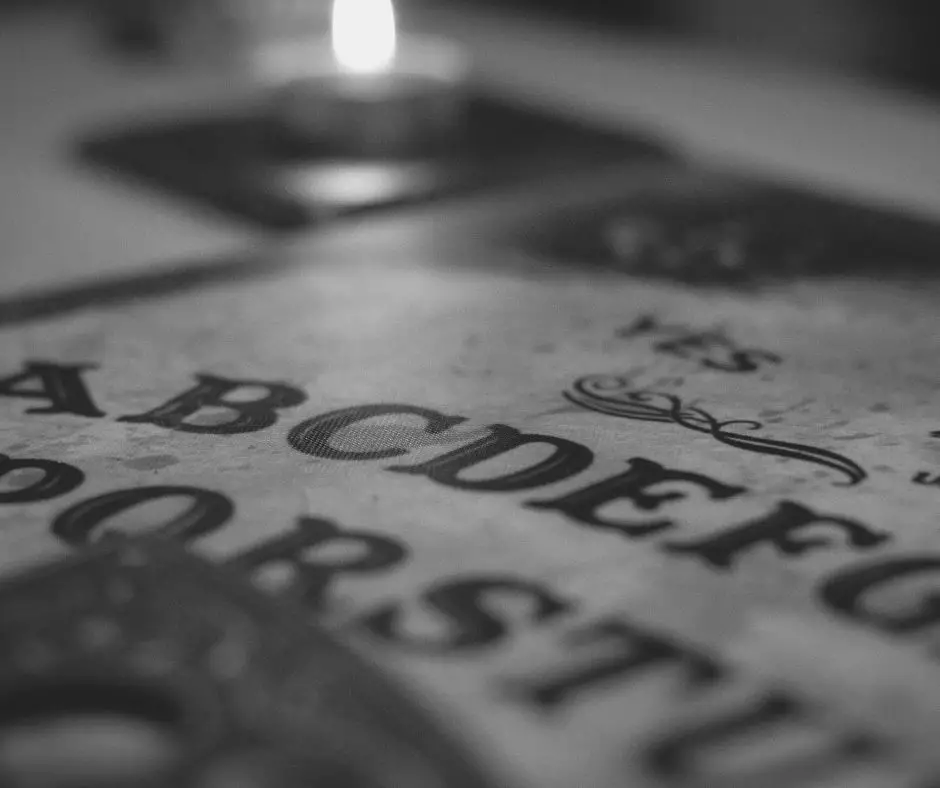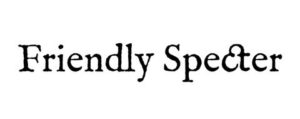A Ouija board is a game used for spirit communications; we all know that. But what does the word Ouija actually mean? Is it a word or just made up? Let’s explore the fascinating etymology of Ouija.
Helen Peters, the inventor’s sister-in-law, asked the board its name, and it answered “Ouija.”The widespread explanation that the French and German words for “yes” – “oui” and “ja” (Ouija) is not valid. It’s an urban legend without grounds.
Many think the word Ouija derives from a foreign language or even religion. The most popular theory is that Ouija is a made-up name where the word for yes in French and German is combined. But later research has shown that the board might have named itself.
Yes, in so many ways

The Ouija is a divination tool surrounded by mystery and lore. One of the main attractions of the board is the thrilling and a bit scary feelings of accessing the unknown – the paranormal space. With this comes stories, urban legends, and ominous warnings – everything to create the perfect storm of curiosity seasoned with a bit of fear.
There are many theories about how the name Ouija came to be. One of the most “popular” is that it is a combination of the French word for yes – “oui” and the German “ja.” This is one of the most popular theories when researching the subject. I found this explanation in most articles, forums, and books about the paranormal.
One heads up, though. There are no explanations or proof of how this theory came about. Not what I could find, at least. I have several paranormal books and encyclopedias, but none gave me a satisfactory answer why they thought Ouija was a combination of “yes.”
Is the Ouija board dangerous? What you should know
Learn about the dangers of Ouija
The combined words for “yes” as the meaning of Ouija are, for example, found in the Ghost Hunter’s Guidebook by Troy Tayor (affiliate link – Amazon). The book is often cited and referred to in the history of Ouija. When researching the topic, Troy Tayor’s book came up repeatedly.
This is the thing with paranormal research, though. If a book becomes very popular, many start to cite the source without digging deeper. I see this phenomenon all the time, in regards to many subjects. It is just spinning content over and over.
Not everyone is in on this theory, though. There is another challenging theory; let’s take a closer look at that one.
The board spelled out its name
Another popular theory is that the board named itself. According to an expert and collector of Ouija boards, Robert Murch , the idea that Ouija was named by combining “Oui” and “Ja” is incorrect. The history is more fascinating than that.
, the idea that Ouija was named by combining “Oui” and “Ja” is incorrect. The history is more fascinating than that.

Murch found evidence in articles and documents that the board probably was named by the inventor’s sister-in-law – Helen Peters. Peters was a psychic medium, and during a session with the board, she asked the board what it wanted to be called. It spelled out “Ouija.” When they asked what Ouija meant, it spelled out “luck”. (The Smithsonian Magazine )
)
This story is also backed by research done by Jeremy Gans, a justice historian. According to him, the board was named by Elijah Bond’s seance with his sister-in-law. The board told the sitters that it wanted to be called Ouija.
Gans also concludes that the name could be spawned through sassy marketing. He also concluded that there was no way to be sure how the board got its name. (Source: Bustle and The Ouija Board Jurors: Mystery, Mischief, and Misery in the Jury System (Affiliate link – Amazon).
(Affiliate link – Amazon).
This story fits in with the selling points of the board overall. It was just what the people wanted to hear. The board was talking, it gave it personality and, of course, authority as a reliable tool for spirit communication. You could access this “oracle” from your own living room together with friends and family.
Ouija and the Spiritualist movement
To better understand the complexity of the Ouija history, we have to look at the era when it was launched. Talking boards (often referred to as Ouija boards), started to get popular during the Spiritualist movement from the 1840s to 1920.
The onset of the Spiritualist movement came after the Civil war (1861 – 1865) and later the First World War (1914-1918). People needed an easy way of connecting to the spirits of dead loved ones as society was plagued by sorrow and hurt people needed comfort.
Proof of the afterlife was central after the wars. Religion was not enough. People wanted solid evidence that there was a life after death. Spiritualism and mediums were a way of getting this “evidence.” It was not conflicting with their religious beliefs, and they had no problem going to Church the day after a seance.
The curiosity for the afterlife has later changed into fear of the unknown. Today many Christians have banned the use of the Ouija as it might pose a danger to the users. This was not the general standpoint when it was launched. The Ouija board is, by many connected to darkness and demons. It is always good to remember that this is relatively “new”.
Ouija was, and still is, one of the easiest ways of experiencing spirit communication without being a psychic or having knowledge of more complex rituals or methods. I bet this is why it took off as it did. It filled a need that was not yet fulfilled—simple mechanics of supply and demand.

Seances and weekend psychics
People loved hosting seances in their homes, and a Ouija board was just everything they needed for a thrilling experience. All participants were engaged in the “game,” and it was structured around a social gathering. As everyone was touching the pointer, you were physically engaged, which sucked you in.
Psychic mediums were prevalent at this time. They were like stars, and now with the Ouija, you could step into their shoes for a night.
You have to remember that the life expectancy was less than 50 years at the time. Women died giving birth, and many children did not reach adulthood. The Ouija board gave people hope that they could talk with their loved ones from the other side. (Source: Smithsonian Magazine ).
).
This is relevant today as well, even if the life expectancy is much higher – world crises often lead to an uptick in spiritualism. It is no wonder that the interest in spiritualism and spirit communication is on the rise yet again.
After the Ouija was featured in pop culture and media as a tool for witchcraft and Satanists, the board game’s reputation was negatively hit. The initial idea behind the board was something different. It was a telegraph to the dead, nothing more, nothing less.
The mystery is a part of the Ouija brand
Having a background in marketing, I can see how these “mysteries” have built the Ouija brand. It is hard for me to let go of the feelings that this might be the idea from the start. I will tell you more about my hunch.
There are two main storylines about how the name Ouija came to be. The most popular one is that the name was combined by the french and the german word for “yes,” and the second one was that it was a powerful psychic asking the board what it wanted to be called.
As I didn’t find any “proof” of the first theory, I have to stick with the other – that the board named itself. The latter idea, which it named itself, has “proof” in an interview with the inventor of the board and research by Murch.
My intuition and experience in marketing send off alarm bells all over, though. The story is a bit too good to be true. It is also very in line with the selling point of the oracle game itself. To gain a patent, there must be a function of the board. It has to be used for something. The story was maybe fabricated in order to achieve the patent. Of course, I have no clues for this. It is just my gut feeling.
Everything (may I say most) things in newspapers are angled and dramatized in some way. Just because it was featured as an interview doesn’t mean it is “true.” Mediums were prevalent, and the stardom of Helen Peters might just as well be a marketing strategy.
When I found an advertisement for the Ouija board and the patent registration, my alarm bells started to sound even louder. They were selling a product for spirit communications, and what way is better to sell it than this? The magical board named itself, and it was when a powerful medium used it.
You can’t sell it by talking about the board’s features – you need to add that extra spark. The game is all about connecting to spirits! There are no winners or losers in this game. I was launching a product like this; I would do it like that. Creating hype with the help of storytelling and riding the wave of the popular mediums. Now you can be one too!

No one knows for sure
Even if there is evidence of the theory that the board itself was named the Ouija board, my intuition as a marketer states that this is not the whole truth. But for now, I have to rest with the research done by Murch. He has dedicated much time and energy to researching the history of Ouija. More than I ever will.
I bet that Murch’s theory is the closest to the truth. The theory has research backing it, and the story aligns with how you would market the game.
If the board spelled out the name is something that we will never know for sure. I would be interesting to ask it again. Wonder what it will tell me, the same or something else… why not try it yourself?
Conclusion
Even if the most popular theory is that the name Ouija is a combination if the words for “yes” in german and french, it is probably not true. Research done by, for example, Robert Murch and Jeremy Gans, points in another direction.
The board was most probably named by the inventor, Elijah J. Bond’s sister-in-law Helen Peters. Helen Peters was a medium that asked the board what it wanted to be called. The board spelled out OUIJA. When she asked what it meant, it said “luck.”
It is impossible to know what is true and not. The Ouija was branded as a thrilling tool for spirit communication during the popular seances. It could be a made-up story to market the board. The mysticism surrounding Ouija is what makes it special and thrilling.
No matter what the truth is, the Ouija board has its place in the spiritual and occult world. Many have played with it as kids and got that frightened look from their parents. This says it all. It is a game for pushing limits and exploring the unknown.
Need to contact a psychic medium?
Visit Keen.com and get 3 minutes for free using this link!


